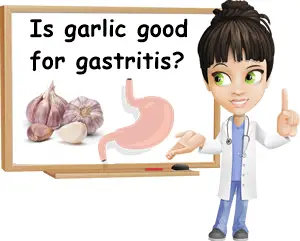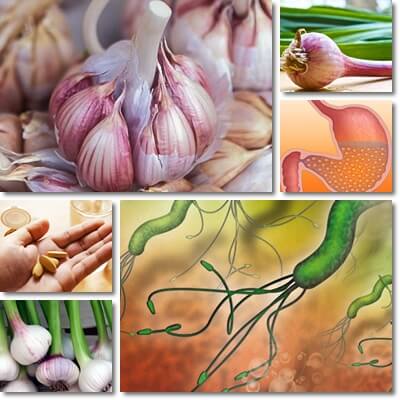Garlic is one of those foods that are apparently universally healthy, but which you should absolutely avoid with gastritis and other digestive conditions such as stomach ulcers, GERD or acid reflux disease. Despite this, eating raw garlic, especially on an empty stomach, or taking garlic pills for the treatment of all kinds of medical conditions, including gastritis, is a far too common practice. However, garlic and gastritis don’t mix well and frequent consumption of garlic, either raw or as a nutritional supplement, can stall healing and trigger flareups in the stomach condition, amplifying symptoms such as heartburn, stomach pain, cramps, nausea, vomiting or burping.
Is garlic good for gastritis?
No, it really isn’t. Garlic holds no real benefits for gastritis treatment, despite being an otherwise healthy food. Studies show that both raw garlic and garlic supplements have antibacterial, antiviral, antibiotic, anti-inflammatory and anticancer properties as well as hold immune system-boosting potential. But none of these benefits apply specifically to gastritis. In simple terms, gastritis is the acute or chronic inflammation of the stomach lining and can have multiple causes. The most common two causative factors are diet and Helicobacter pylori infections.

- In what way is garlic supposed to be good for gastritis?
In theory, the compounds responsible for its antibiotic and anti-inflammatory properties may hold benefits for eradicating H. pylori infections that cause the stomach condition. But gastritis isn’t caused just by H.pylori infections. Furthermore, H. pylori infections are not eradicated by eating garlic – you still need 2-3 different antibiotics and proton-pump inhibitors to treat an H. pylori infection. Yes, garlic can boost the immune system, and that is a good thing, but it doesn’t actually treat the infection, no matter how much of it you eat or for how long. Just as important, the biologically active constituents in garlic responsible for both its therapeutic properties and specific pungency act as irritants and ingesting them, especially in large amounts, will worsen gastritis and cause flare ups. The same is true for other pungent foods, including onions, leek, ginger or turmeric.
Gastritis and garlic pills
A common practice among gastritis sufferers, and healthy people too, is to take garlic pills as nutritional supplements. Because the effects of eating raw garlic in normal food amounts are not strong enough to produce visible benefits for gastritis, there is the belief that getting the biologically active compounds in garlic in a concentrated formula (a supplement) will produce visible benefits for the condition.
- But are garlic pills effective for treating gastritis?
No, they aren’t effective. Garlic pills will worsen symptoms and delay healing if used for treating gastritis. The severity of the side effects is directly proportional with intake, that is dose and duration of supplementation. Because they basically concentrate the biologically active compounds in garlic, pungent organic sulfur compounds such as allicin, which also act as irritants, these supplements will actually produce a stronger irritating effect on the stomach lining. And this is not a desirable outcome for anyone with the condition.

Garlic and stomach hurt
Whether it’s raw and eaten in normal food amounts, or in concentrated pill form, taken as a nutritional supplement, garlic retains its therapeutic as well as irritant properties. When consumed too often or in too large amounts, or even infrequently and in normal food amounts, it has the potential to make the stomach hurt. For some people, garlic makes the stomach hurt or cramp almost instantly, mere minutes after ingestion, especially when it’s eaten on an empty stomach. For gastritis sufferers whose stomach lining is already irritated and inflamed, even one or two cloves can trigger side effects such as stomach upset, stomach pain, cramps, nausea, vomiting, acid reflux, heartburn and burping and bloating. Imagine the side effects if you have too much. Also see these 8 side effects of eating garlic.
How to heal gastritis
If you are looking to heal your gastritis as quickly as possible, then start by excluding problematic foods from your diet. This will include all kinds of garlic (white, red, purple, black, raw or supplements) and related vegetables: spring garlic, onions, green onions or scallions, shallots, leek, chives. Other pungent foods such as pepper, spicy peppers, ginger or turmeric are bad foods to eat with gastritis as well. Also see the 5 reasons turmeric is bad for you.
Basically anything that works up the stomach, is difficult to digest or takes longer to digest, causing the production of more stomach acid, or acts as an irritant, makes the list of foods to avoid with gastritis. And garlic is one of the foods to absolutely avoid. The fact that it holds no real benefit for healing gastritis is more reason to avoid it. At least temporarily. Find out more about what foods to eat and to avoid for gastritis.
There actually isn’t such a thing as a food that heals gastritis because the stomach lining will heal itself – the only help our stomach needs from us in terms of diet is to stop feeding it spicy, pungent, acidic, fermented, fatty, heavy or processed foods that require more work to be digested. The list of bad foods includes coffee and caffeinated products and alcohol. If you’re at a loss where to begin or could use some tips from a former gastritis sufferer, check out my 1 week gastritis diet plan.
Conclusion
My take on things is to just be careful with anything that is presented to you as the final, absolute best solution to all of your health problems. There’s a reason why they say that, if something is too good to be true, it probably is. Nobody wants to take the hard road, but all good things require some degree of effort, including treating gastritis. That means seeing a doctor, taking your prescribed medication as advised and drastically changing your diet by adopting healthier eating habits, tailored to the requirements of the stomach condition. To be honest, it’s not as bad as it sounds – it’s simply a matter of taking up healthier habits.
